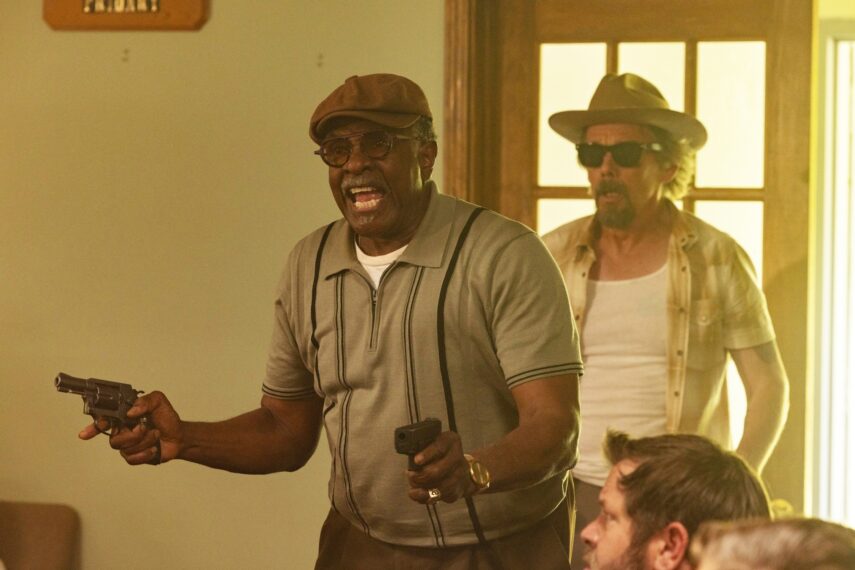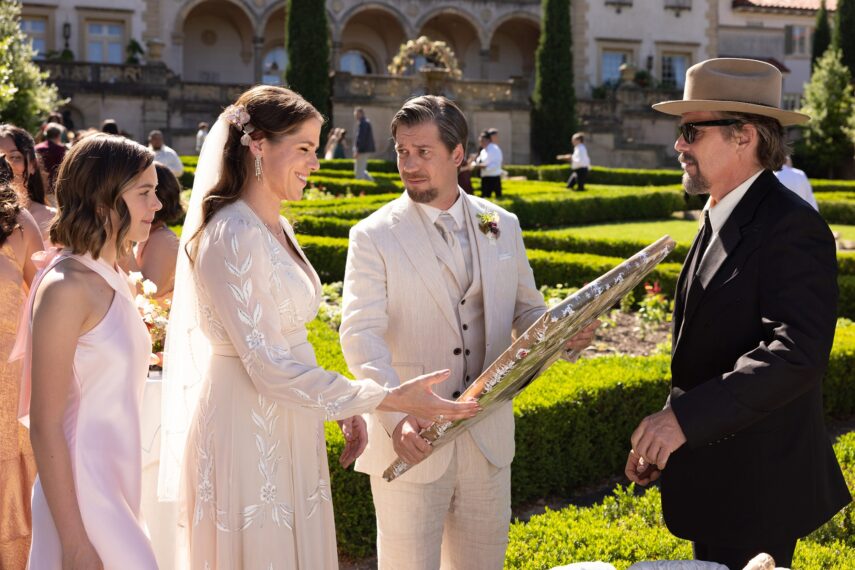What To Know
- The Lowdown star Ethan Hawke discusses the show’s season finale episode, “The Sensitive Kind.”
- The actor teases what could happen next after the ending.
- Plus, get an exclusive peek at an intimate conversation between Hawke and costar Kyle MacLachlan.
[Warning: The below contains MAJOR spoilers for The Lowdown Season 1 Episode 8, “The Sensitive Kind.”]
The debut season of FX‘s ragtag noir The Lowdown, from creator Sterlin Harjo, came to an explosive ending as the mystery behind Dale Washberg’s (Tim Blake Nelson) death was unraveled by Tulsa’s resident “trusthstorian,” Lee Raybon (Ethan Hawke).
The episode, “The Sensitive Kind,” opened up where the previous episode left off, moments after Lee had chased Akron businessman Frank (Tracy Letts) into the One Well Church helmed by Mark Russell (Paul Sparks). As Lee realized he’d stepped into some real potential danger amidst the neo Nazis, Marty (Keith David) entered the space and claimed he was undercover and taking Lee into custody.
The ruse lasted only seconds for the men to get out the door and into Lee’s van, but they didn’t get away unscathed as Marty got grazed by a stray bullet when the One Well group charged after them, guns ablaze. While the men ultimately got away, Lee faced the consequences of his actions when artist Chutto (Mato Wayuhi) broke his shop window in retaliation for his grandfather Arthur’s (Graham Greene) death, which was unknowingly put in motion when he called Betty Jo (Jeanne Tripplehorn) and she sent Frank in search of Dale’s lost will.
While Lee told Chutto the land Dale had wanted to gift Arthur belonged to him, the young man didn’t want it, and that left the reporter to rethink his next move. As he tried to piece his latest story together, Lee faced his relationship with his daughter, Francis (Ryan Kiera Armstrong), who read a poem about his breakup with ex-wife Sam (Kaniehtiio Horn), which also forced Lee to reconcile his role as a father.
Shane Brown / FX
After he left Dale’s letters to his daughter Pearl (Ken Pomeroy), Betty Jo called Lee up, enraged and wanting answers, but that was exactly what Lee hoped for. The pair met in a neutral spot, and while Lee couldn’t say if the letters revealed that Donald (Kyle MacLachlan) was Pearl’s biological father, the conversation revealed that she had knowledge of Dale’s true death.
Lee took that and went off to write his story, but he recruited Marty to get Donald to a neutral location at Cyrus’s (Killer Mike) office to allow the political candidate an opportunity to read it first and offer a statement. Lee explained that Dale had been shot accidentally and was originally meant to be scared into selling his land. When Lee relayed to Donald that he had an opportunity to do something good with Dale’s legacy, he decided to gift the land to the Osage and cut ties with the wealthy power players in the area.
The episode concluded with Lee attending Sam’s wedding to Johnny (Rafael Casal), where he wished the newlyweds well, and set a boundary with his daughter, putting her best interest ahead of his own by telling her to stay full-time with her mother and stepfather. It was both a buttoned-up and open ending in a way that leaves us satisfied and hungry for more.
Below, star Ethan Hawke breaks down the finale’s highlights on community, filming alongside a star-studded ensemble, and the importance of story. (Plus, get an exclusive look at an intimate conversation between Hawke and MacLachlan in the video below).
I loved that book shop moment from the beginning, where Lee interacts with Dale, and later in the episode, when Donald asks if they ever met, Lee says he never did. Was he lying, or did he just not remember meeting Dale?
Ethan Hawke: It’s kind of wonderfully mysterious, isn’t it? In my imagination, Lee didn’t remember that he’d met him until right then, all of a sudden. Sometimes that happens to you. You’re like, “Oh, wait, I remember something I hadn’t remembered before.” But he doesn’t have the confidence to verbalize it. Or maybe he always remembered, I don’t know. But it kind of gets at the wonderful nuance of truth-telling and how we all shade and hide the truth for when it makes sense to us and when we want to. And that’s how a lot of accidents happen.
That confrontation at One Well Church when Marty has to step in and save Lee is tense. How was it filming that sequence?
It was such a strange day of shooting to have all these unbelievably talented people there. I mean, Tracy Letts is one of the great American playwrights, and there he is acting with us, and Tom McCarthy is a brilliant filmmaker himself, and he’s there. Keith’s so genuine, a bona fide legend. I’ve loved Paul Sparks’ acting forever; he is one of my favorite actors. And so it was a great group of people. One of the fun things about playing Lee is that he’s just always thinking on his feet. He doesn’t really have a plan, and sometimes he’s really brave but in a stupid way. None of it’s thought out, and I don’t think he thinks through that moment. He’s just chasing [Frank] into that church, not really thinking about what he’s going to do, and then he’s just a cat trying to stay alive.

Shane Brown / FX
Speaking of Lee not thinking things through, he ultimately got Arthur killed in the previous episode because he spoke too openly in front of Betty Jo, and Lee is on the receiving end of Chutto’s anger because of it. Was that a learning moment for him? Will he be more careful moving forward?
I think it’s what pushes the show into the deep end of the pool. It’s that sometimes all these characters — Lee and everybody — they’re breaking hearts and doing good and bad things simultaneously, and that’s the complexity and nuance of real life. Good guys don’t wear white hats and bad guys don’t wear black hats. I do think that scene that you mentioned with Chutto is the first real smack of humility that Lee gets. He sees himself as a caped crusader, and he’s forced to stare in the mirror and see that he’s not clean. And the great thing about that is if you can absorb humility the right way, it can lead to compassion. It’s what makes him able to make the necessary compromises to put aside the article he wants to write and write a different article that actually could serve a good purpose, and also helps him to be a good enough man and father to show up for his daughter at his ex-wife’s wedding.
Lee and Donald’s conversation in Cyrus’s office reveals that he didn’t know Betty Jo had gotten Dale killed. How important is it for Lee and Donald to share that moment of connection that leads to Donald handing over Dale’s land to the Osage?
Whether he’s doing that just to get out of trouble or whether he is doing it to be a good person, we don’t really know, but it doesn’t really matter. He’s doing the right thing. My favorite part of the show is when the season starts with Lee comparing Donald Washburg to Adolf Hitler, which is what we do when we want to demonize somebody today. The left wing calls people Adolf Hitler, the right wing calls people Nazis… And of course, at the end of the show, he realizes, this is a human being trying to play the cards he’s dealt. He thinks he’s a good person. He didn’t know that his brother was murdered; he wasn’t a part of it. He did look the other way when it was to his best interest, which is exactly what Lee’s done.

Shane Brown / FX
Did you know how Dale’s death really unfolded throughout filming, or did you learn when filming the finale episode? How did that process unfold?
The process was so mysterious. It really started with Sterlin having this idea for a show, and I don’t think he really knew exactly where it was going. He knew how it was going to end, and he knew what the feeling was. How we got there was mysterious to all of us. In a lot of ways, the show’s really about community, and the mystery is in service of the characters, which is why I love it.
In one of our first conversations about it, we talked through the wedding scene with the daughter and knew that was what it had to drive towards. It’s Lee’s journey about what it means to be a good man and how we can view our sensitivities as strengths and not weaknesses. The whole murder mystery part of it had some movement as we told the story. I used to make up stories for my kids when they would fall asleep, and sometimes, when you just let your subconscious roll, great stuff happens. They would fall asleep [and I’d be like] I’ve got to go write that down, but then I could never remember it.
Where do you think Lee and Francis stand after he tells her to live with her mother full-time? Is there a sense of rejection there?
It’s wonderfully nuanced because for the first time, he’s really trying to see what is in her best interest, and he sees that she has a good stepfather and that they have a good thing going, and that might be a great resource and value to her. He’s not seeing her life as a reflection of him, but as her own life. And so, in a way, it’s a mark of wisdom, and in another way, it’s really disappointing to her. She wants to be loved wholly and completely and blindly. And I think the feeling I get from that last scene is that they’re going to find their way, but I would love to do a second season just because her character’s getting to be a really interesting age and her problems are going to get more complicated. It’d be wonderful to see Lee try to parent a teenage daughter.
The full-circle nature of Lee gifting Samantha the painting he stole in the premiere episode is so satisfying. Is there more to uncover in terms of their history?
I think so, definitely. I mean, Tiio and Rafael are such great actors, and I would love to see the ongoing dynamics between all three of them. I would love to see future parent-teacher conferences where they all sit there and pick her.
Have there been any discussions about where the show might go if it’s picked up for Season 2?
Of course, we can’t help but daydream, but the truth is, I feel really proud of Episode 8. I love the way the show resolves, and I’m excited for audiences to see it. And the TV gods have to decide whether or not there’s an audience for it.
FX’s The Lowdown, Season 1, Streaming now, Hulu
This story originally appeared on TV Insider

